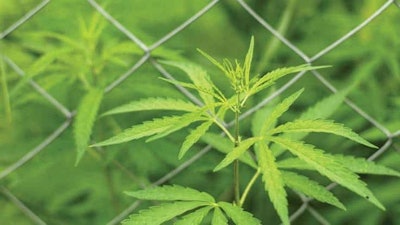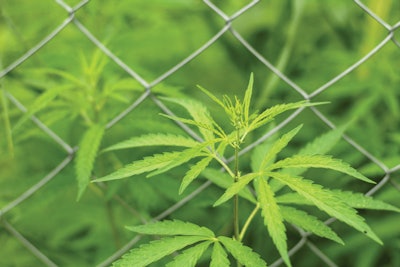

With the explosive growth seen in hemp cultivation over the last three years, many hemp farmers are learning the hard way that they need to secure their crop from both theft and herbivory damage. In some cases, high-grade hemp flowers may be mistaken for their intoxicating sibling, high-THC cannabis, and taken by thieves hoping to make a quick buck. In other cases, wandering herds of deer may decide they would like to stop for a snack. Outlined below are a few things you can do to ensure you have a secure and protected hemp crop.
1. Set up fencing.
Fencing is key to keep out trespassers that are both human and cloven-hoofed, including deer, elk, rogue goats, and other large herbivores. Fencing should be a minimum of 8 feet high (10 feet if you have problems with elk), which will keep most animal trespassers at bay. At Puffin Farm, we use an extruded plastic deer fence product that is ultraviolet-resistant, which prevents sun degradation, and reinforced on the bottom so it can be staked for extra protection. It costs about $1,000 per acre and is easy to install. Metal deer fencing is also an option and can be found in both stainless steel and galvanized metal. More expensive options include chain link or wood.
2. Increase your security with cameras.
If you need to take things to the next level, you can install cameras around the fence perimeter or at key locations such as gates. While we do not have a need to do this for our hemp crop, we do use cameras on our THC cannabis crop. Simple game cameras can be a good way to go if you want to see which uninvited animals or people are visiting, while a high-tech digital video recorder-based system like the ones used on cannabis farms can provide more extensive coverage and storage capabilities.
3. Consider installing an alarm system.
If you have high security needs, install outdoor alarm systems that use lasers or infrared cameras to detect motion and trigger a call to the authorities. These systems are quite expensive and require professional alarm companies with special capabilities, but they are an option if needed. We use one at our Seattle facility to secure our outdoor space there.
4. Guards are the best deterrent.
Having a constant physical presence is the best deterrent but is unrealistic for most farmers who cannot stay in their field 24/7. A professional security guard is an option, though it is quite pricey.
5. Dogs can present problems.
You need to be very careful if using dogs for security as they can present liability and insurance issues. A friendly farm dog who barks when strangers or animals come near is a good way to be warned about the presence of intruders or scare them off, but think twice before leaving out a dangerous or unsupervised dog.















